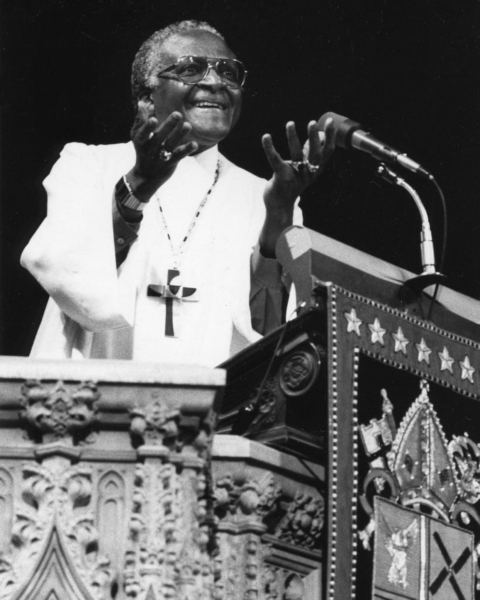Presiding bishop and other dignitaries remember Archbishop Desmond Tutu’s gracious moral strength at memorial servicePosted Feb 14, 2022 |
|
[Episcopal News Service] At a memorial service for Archbishop Desmond Tutu at the Cathedral Church of St. John the Divine in New York City on Feb. 13, Presiding Bishop Michael Curry remembered the former primate of the Anglican Church of Southern Africa as a relentless optimist who saw the promise of Easter even when it looked like Good Friday.
In addition to a sermon from Curry, the memorial service for Tutu, who died on Dec. 26, 2021, at age 90, featured eulogies from international dignitaries and prayers and hymns in multiple ethnic and religious traditions.
Tutu was remembered for his steadfast commitment to a just, nonviolent end to the apartheid regime in South Africa – an effort that won him the Nobel Peace Prize in 1984. The success of that movement culminated in the 1994 election of Nelson Mandela, who named Tutu the chairman of the national Truth and Reconciliation Commission. Tutu’s leadership lent credibility to the commission’s work of exposing the atrocities of apartheid and pursuing restorative justice.
Amidst “the darkness of bigotry, the darkness of animosity, the darkness of arrogance, the darkness of injustice, [Tutu’s voice] reminded [us], it is Easter,” Curry said in his sermon. “Goodness is stronger than evil. That voice, sometimes with a smile, [said,] ‘Love is stronger than hate.’
“The voice of that little man. Remember how little he was? Before I met him the first time, back in the ‘80s, I just knew he was as big as LeBron James. And he was bigger than that!”
Curry recalled going to hear Tutu speak during “the dark days” in South Africa, when Mandela and other Black political leaders were still in prison.
“He ended it by saying, ‘I believe that one day, my beloved South Africa will be free. I believe that one day she will be free for all of her children: Black, brown, colored, white, Asian, all of her children. I believe that one day, my beloved South Africa will be the land of all the rainbow children of God,’” Curry recalled, referring to the phrase “rainbow nation” coined by Tutu describing the diversity of South Africa. “‘I believe that God has a dream for South Africa and nothing can stop God’s dream. I believe that because he raised Jesus from the dead and if God can do that, look out, apartheid. You’ve already lost.’”
Curry also drew parallels between Tutu’s fight for justice in South Africa in the 1980s and 1990s and the challenges facing the world today. The guiding principle in these efforts, Curry said, must be the golden rule of loving God with all one’s heart and loving one’s neighbor as oneself.
“Do that and you will figure out how to make poverty history so that folks aren’t suffering in this world anymore. Do that and we will make sure that vaccines are available around the world and not just for us, who are privileged in this part of the world,” Curry said, drawing applause from the in-person audience, limited due to COVID-19.

Archbishop Desmond Tutu speaks at the Cathedral Church of St. John the Divine in New York City in 1986. Photo: Mary Bloom/Cathedral Church of St. John the Divine
“Do that even as the sabers are rattling around the world, even as we gather here tonight. Do that and we’ll learn how to lay down our swords and shields down by the riverside and study war no more.”
The service at St. John the Divine, where Tutu spoke in 1986 to thank Americans for protesting against apartheid, was led by New York Bishop Andrew Dietsche and included eulogies from former U.S. Rep. Charles Rangel; Nomaindiya Cathleen Mfeketo, South Africa’s ambassador to the U.S.; Mathu Joyini, South Africa’s representative to the United Nations; and Abdulla Shahid, president of the U.N. General Assembly. Rabbi Geoffrey Basik and Imam Mohamad Bashar Arafat offered Jewish and Muslim prayers, respectively.
In his eulogy, Rangel remembered “that smile, that wit, that eloquence that Bishop Tutu had” and credited Tutu as an inspiration for his own political career, which included representing New York in the House of Representatives from 1971 to 2017. Rangel said he admired Tutu’s boldness in applying Christian values to political problems, a trait Rangel said should be reclaimed by Christians.
“His life has shattered the myth of the separation that we should have between our churches and our spiritual institutions and our policies,” Rangel said. “If [our] spiritual leaders are separate and neutral in the things that we do, then all of the things that Jesus said that we should do in making certain that we treat the lesser of our brothers and sisters – it just doesn’t make sense.”
The music included a traditional Namibian song, an African American spiritual and the South African hymn “Siyahamba,” with lyrics sung in English, Zulu and Spanish, and the service closed with an organ and saxophone rendition of “Nkosi Sikelel’ iAfrika (God Bless Africa),” the South African national anthem.
– Egan Millard is an assistant editor and reporter for Episcopal News Service. He can be reached at emillard@episcopalchurch.org.

Social Menu